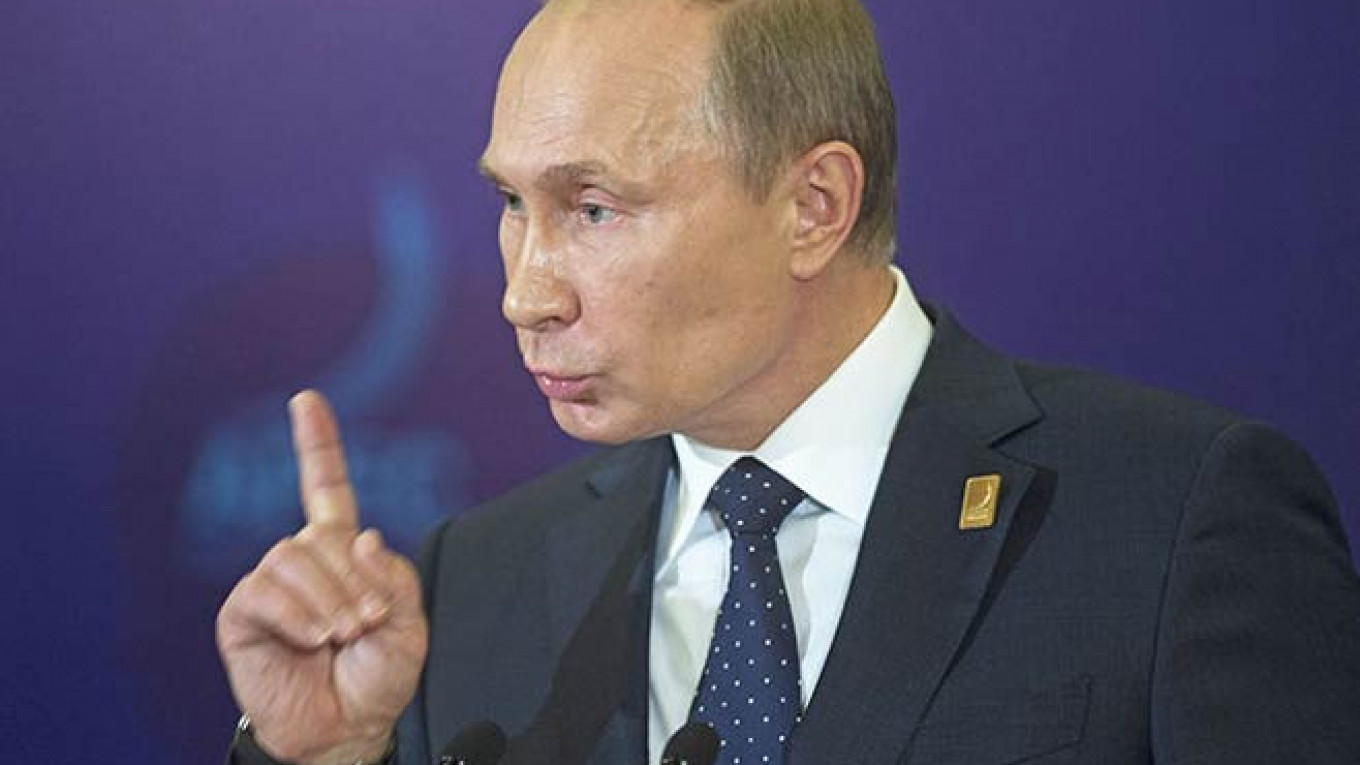As the Ukrainian crisis intensifies, Western policymakers are still struggling to come to terms with the logic of Russia's actions in Ukraine. Instead of formulating a strategy to stabilize Ukraine, they have participated in a Russian-orchestrated game to de-escalate tensions in which they have pretended that Russia is a partner that shares the same objective.
The April 17 Geneva agreement has proved meaningless because Russia has chosen to escalate tensions to achieve its version of stabilization: a "federalized" Ukraine with its industrial heartland under de facto Russian control.
The other part of the West's response has been sanctions. So far, they have had little impact on Moscow because of their limited nature.
Western policymakers need to recognize that while President Vladimir Putin is playing an audacious game, he has started to box himself in. To advance toward his goal, he has to escalate the situation further. The reputed master tactician is not necessarily a brilliant strategist. He may even be a poor tactician if he is reacting to events more than he is controlling them.
Putin's foray into Ukraine has come up against four serious problems:
1. Crimea is now a Russian island. It is dependent on water and electricity supplied from mainland Ukraine as well as road access across Ukrainian territory. Russia controls none of these and cannot create substitutes quickly. Preserving these links is a necessity that might require military intervention.
2. The people of southeastern Ukraine have not risen up in support of the separatists, indicating that there is limited appetite in these regions for secession from Ukraine. Foiling the May 25 presidential election will probably require using Russian proxies to stir up further trouble. The risk, however, is that the violence on both sides could easily spin out of control.
3. Kiev is trying to stand its ground and is deploying forces in an effort to evict the separatists. Even partial success by the Ukrainian Army will increase the pressure on Putin to intervene militarily to protect Russian speakers. Russia's constant warnings about chaos and civil war in Ukraine appears to be intended to prepare the public for a decisive move to stabilize Ukraine — perhaps by sending "peacekeeping forces" to the eastern regions of Ukraine. This would certainly force Western countries to adopt tougher punitive measures, possibly sector-specific sanctions, but if Putin hesitates to act, he risks showing weakness
4. "Federalization" does not solve the problem of the self-proclaimed republic of Transdnestr and increases the need to create a land bridge to Ukraine's western border. This carries significant risks because it would very likely trigger a war with Ukraine. This would probably be a prolonged military conflict, particularly given the history of partisan resistance in the western regions.
While Putin is encountering difficulties at the tactical level, he is losing ground at the strategic level because of the growing levels of alienation that his policies are creating beyond the Luhansk and Donetsk regions. Outside these areas, economic and cultural links with Russia are less strong and Ukrainian identity is more developed.
For Ukrainians in these parts of the country, the Russian model of governance has been unattractive for most of the 23 years Ukraine has been independent. It holds even less appeal after Russia's aggression against Ukraine and its shift to an old-fashioned brand of conservative imperialism.
By contrast, the remarkable transformation of Poland over the past 20 years has had a profound influence on Ukrainians' perceptions of their own shortcomings and highlighted the possibilities of reforming Ukraine on a European model. In December, Putin dismissed the Ukrainian opposition's focus on Europe, arguing that it was easy to mislead people about what a European Union Association Agreement really involved by seducing them with visions of living in Paris. This remark betrayed a lack of understanding of how politics in Ukraine had changed.
Ukraine's February revolution demonstrated that there is a strong and growing constituency in Ukrainian society that will no longer tolerate crony capitalism. Ukrainians are determined to build new institutions to protect their rights and hold their leaders accountable.
If Western policymakers are serious about countering Russia's effort to dismantle Ukraine, they need to think beyond tactical "de-escalation" to exploit Russia's chief weakness in Ukraine: its inability to offer an attractive way of life to Ukrainians.
Ukrainians need to hear an unequivocal message from the West saying that it will support the modernization of Ukraine and will find resources to help put the country on a different trajectory — if that is what Ukrainians choose.
Although Putin holds important political and economic levers in Ukraine, he is vulnerable at both the tactical and strategic levels. If he escalates the situation further, he faces the risk of setting off uncontrolled violence. Conflict of this kind would not necessarily stop at the Russian border. It might have a boomerang effect on Russia itself, encouraging some regions to try to redefine their relations with Moscow.
Putin has suffered serious policy failures in Ukraine on two previous occasions based on a misreading of attitudes in Ukraine. The first was when he backed Viktor Yanukovych's fraudulent victory in the 2004 presidential election, only to see the Orange Revolution install a government friendly to the West. The second failure came in February with the spectacular collapse of Yanukovych's rule after he had strong-armed the Ukrainian president into rejecting the Association Agreement with the EU.
Western policymakers have yet to decide if they are prepared to stand up for Ukraine and, if so, how far their support will extend. As they weigh their options, they should consider the vulnerabilities that Putin has created for himself and recognize that strong Western support for deep reforms to modernize Ukraine is the most powerful tool available for resisting Russia's efforts to destroy the country.
John Lough is an associate fellow with the Russia & Eurasia Program at Chatham House.
A Message from The Moscow Times:
Dear readers,
We are facing unprecedented challenges. Russia's Prosecutor General's Office has designated The Moscow Times as an "undesirable" organization, criminalizing our work and putting our staff at risk of prosecution. This follows our earlier unjust labeling as a "foreign agent."
These actions are direct attempts to silence independent journalism in Russia. The authorities claim our work "discredits the decisions of the Russian leadership." We see things differently: we strive to provide accurate, unbiased reporting on Russia.
We, the journalists of The Moscow Times, refuse to be silenced. But to continue our work, we need your help.
Your support, no matter how small, makes a world of difference. If you can, please support us monthly starting from just $2. It's quick to set up, and every contribution makes a significant impact.
By supporting The Moscow Times, you're defending open, independent journalism in the face of repression. Thank you for standing with us.
Remind me later.







